Bishops of the Symposium of Episcopal Conferences of Africa and Madagascar (SECAM) on Sunday ended the 50th anniversary meeting of the continental body with a commitment to intensify the pastoral care of the family.
In a list of pledges, the bishops who met in Kampala, Uganda from 22- 29 July emphasised the family – built on the union of man and woman – as the first unit of evangelisation.
“Confronted with the anguish of our people … SECAM from the beginning aimed at being the sign of hope, especially for families and countries,” said the bishops in a statement read out by Cardinal John Njue of Kenya. “That is why SECAM has kept insisting on the family’s importance, vocation and nature.” South African Cardinal Wilfrid Napier said the Church must let “gospel” happen in the family, which was also “the great family of God”, as seen in the “pilgrimage church in the villages of Africa and Madagascar.”
More than 400 delegates – including cardinals, archbishops, bishops, priests and Catholic sisters from nearly 40 national and regional organisations – attended the week-long meeting, which elected Cardinal Philippe Nakellentuba Ouédraogo of Burkina Faso as the next president of SECAM.
Pope VI visit to Uganda in 1969 resulted in SECAM’s formation. The East African country is the home of the 1885 and 1887 martyrs, who Christians revere as a symbol of unshaken faith.
According to the bishops, SECAM’s Golden Jubilee signified a commitment to reconciliation, justice and peace. In their view, the commitment promoted communion and pastoral solidarity which enabled the African church to stand together against challenges such as ideological colonisation, land grabbing, political and democratic destabilisation, human trafficking, terrorism and arms trafficking.
“We commit ourselves …to address the problem of migrants, refugees and all who are still victims of slavery and human trafficking,” said bishops, while pledging to deepen collaboration with our political leaders and called them to accountability so as to put our human and natural resources at the service of development, reconciliation, justice and peace," said the bishops.
A list of commitments and recommendations at the end of the meeting included, among others, a pledge to invest in biblical, theological, moral and spiritual formation, making the jubilee a springboard for new evangelisation, and promotion of the professional, moral and spiritual education of children.
They also want intensified studies on African Traditional Religions, Islam, new religious movements, secret societies and problem posed by witchcraft.
The bishops had also urged religious communities to bear witness to the church’s mission of evangelisation, engage in missionary exchange among diocese of the continent, particularly with those of North Africa and to maintain contact with the universal church.
Bishop Sithembele Sipuka of South Africa warned the bishops of “Afro –Pessimism” and the opposite Afro- Optimism, he said tended to romanticise Africa.
“We must neither be overly pessimistic or over optimistic about Africa, but be Afro-realistic,” he said in a closing sermon.
Young delegates put forward a proposal for a youth apostolate. Archbishop Luke Thomas Msusa of Blantyre, Malawi said: “If we ignore the call of our young people today and continue business as usual without recognising them [or] empowering them, it means the SECAM of tomorrow will not be very powerful. We the bishops in SECAM should give them space so that they may be good leaders of tomorrow.”
Cardinal Ouédraogo replaced Archbishop of Lubango, Angola Gabriel Mbilingi, who has served as president of SECAM for the past six years.
Also elected as first vice president was the Bishop of Umtata Diocese, South Africa, Sithembele Anton Sipuka, while the second vice president is Bishop Lucio Andrice Muandula of the Diocese of Xai-Xai, Mozambique.
Fr Terwase Henry Akaabiam of Nigeria was appointed new secretary-general of SECAM, replacing Fr Joseph Komakoma of Zambia, who has equally completed a two-term mandate.
In the final message at the celebrations, the new President said that the organisation will soon finalise the outcome of the SECAM discussions in a compiled work to be known as the “Kampala Document.”
“To keep alive the momentum of the Jubilee, SECAM will issue an important document, the Kampala Document, which will help the people of God (in Africa) deepen their knowledge of Christ our Saviour and make Him known as the Way, the Truth and the Life,” the Cardinal said.
Cardinal Ouédraogo further outlined that through its socio-pastoral organs such as Caritas and justice and peace commissions, SECAM would continue to commit itself to the care of migrants and refugees, and to the protection of integral ecology.
“The golden jubilee of SECAM is a commitment to the service of reconciliation, justice and peace which promotes communion and pastoral solidarity,” he said.
As the celebrations came to a conclusion, Uganda Martyrs shrine Munyonyo, was elevated to a Minor Basilica on Monday July 29 at a Mass presided over by His Eminence Robert Cardinal Sarah, Prefect of Divine Worship and Discipline of the Sacraments on behalf of Pope Francis.



 Loading ...
Loading ...